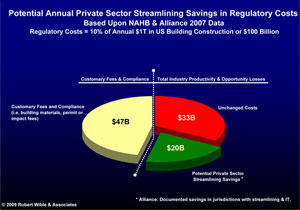We need a build-out. We need a buildup. We need a national makeover. But we must make certain that every bailout dollar, which we’re borrowing from our kids’ future, is spent wisely. So opined New York Times columnist Thomas Friedman on Dec. 24 on then President-elect Obama’s proposed stimulus package.
ENR readers know only too well the need for a build-up, especially of the nation’s long-neglected infrastructure. Elected officials know this as well, and everyone has their own list of “shovel-ready” projects worthy of stimulus package funding.
But while we are talking about projects being shovel ready, who has been thinking about ways to make sure that the funds provided by Congress and the new administration are spent wisely? How do we stretch these dollars as far as possible by, among other things, assuring that construction projects do not waste funds bogged down in slow, cumbersome, inefficient regulatory systems at the state and/or local government level, 80% of which have remained little changed since the 1950s? Indeed, how many jurisdictions where these proposed projects will be built are “regulatory ready”?

WIBLE
Over the past 10 years a growing number of jurisdictions, supported by forward-thinking officials, the construction industry and building owners, have streamlined their building and land-use regulatory systems and where appropriate applied information technology to improve their effectiveness and efficiency, thereby increasing energy conservation, economic competitiveness and disaster resiliency.
This is not about regulatory abandonment. This is about increasing the efficiency of modern construction codes, rules and regulations and reducing the amount of time it takes to move a new building or building renovation through the regulatory process by as much as 60%. Such changes could save the public and private sectors tens of billions of dollars annually.
Consider the following:
- E-permit processing now used in over 500 jurisdictions reduces staff and building owner/architect times to process permits by 30% to 40%.
- Interactive voice-response systems reduce the time to schedule and conduct inspections from two to three days to less than 24 hours
- Mobile field inspection technology increases the number of inspections performed per day by 25% and reduces contractor down-time waiting for inspections and their results by 20%.
- E-plan review now being conducted in dozens of jurisdictions reduces the amount of time it takes to review plans by 40%, eliminates lost plans, and reduces by 80% the number of trips by out-of-state owners/architects.
- Streamlined processes are getting buildings up and open faster, putting people to work and revenue into the jurisdiction’s coffers sooner. For example, a 200-room hotel opened three months earlier using streamlined processes; an 80% occupancy rate generated $144,000 in added tax revenue just from the occupancy tax on $100-per-night rooms.
Thus far only 10% of jurisdictions nationwide have streamlined and applied IT to some portion of their programs. Can our nation, community and your clients continue to afford such inefficiency? Are the jurisdictions in which you are building or plan to build “regulatory ready”?
Working with a number of jurisdictions, Alliance for Building Regulatory Reform in the Digital Age, now a part of the FIATECH Streamlining Project, has developed a set of tools for downloading and sharing with elected officials and staff on how to achieve similar savings, making more communities regulatory ready. These tools include a Streamlining Toolkit, IT guides, model legislation, regulations and procurement requirements, surveys and a return-on-investment study showing that communities that streamline and apply IT to their processes achieve payback within one year.
Streamlining Project Partners and FIATECH urge readers to visit our Websites www.natlpartner streamline.org and www.fiatech.org to review and download these tools and consider joining us to help assure economic stimulus project funds are spent wisely and that effective and efficient regulatory systems for land use and construction support a sustainable and revitalized American economy.




Post a comment to this article
Report Abusive Comment